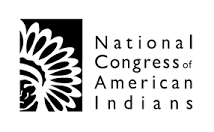We protested last year at the NCAI Marketplace, and confronted NCAI's Vice President Mark Macarro over his tribe's denial and ending of tribal citizenship.
The adoption of Resolution 20-001 by the NCAI spearheaded by noted Native Armerican attorney Gabriel Galanda was a positive step towards protecting Tribal Citizenship rights, but the failure of the Executive Committee to create the task force suggests that there may be issues with the organization's commitment to its own resolutions.
The National Congress of American Indians (NCAI) is the oldest, largest, and most representative American Indian and Alaska Native organization in the country. It was founded in 1944 and represents tribal governments across the United States. Do they deserve the respect?
In 2020, the NCAI adopted Resolution 20-001, which called for the creation of a task force to protect Tribal Citizenship rights. The resolution was proposed in response to concerns about the protection of all Native American's rights, which have historically been undermined by disenrolling tribes
The NCAI Executive Committee has ignored the resolution and refused to create the task force. This raises questions about the commitment of the NCAI to protect tribal citizenship rights and the effectiveness of the organization in achieving its goals.
The strength of the NCAI as an organization is closely tied to its willingness to honor its own resolutions. This is because resolutions are a key way that the organization communicates its priorities and objectives to its members and to external stakeholders. If the NCAI is not willing to follow through on its resolutions, it undermines its credibility and effectiveness as an advocate for tribal sovereignty and rights.
WE DEMAND that the NCAI not be hosted by ANY Tribe where disenrollment has occurred. Please pass on to Fawn Sharp, as she has blog Original Pechanga from Twitter.

2 comments:
How many disenrollments before the casino boom ?
that's an easy one...practically none...of course....
Post a Comment